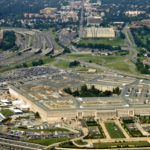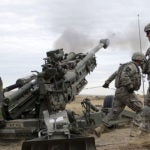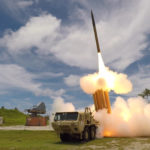
Blue Angels Mishap. Investigators have concluded that pilot error caused a Navy Blue Angels F/A-18C jet to crash during a practice flight in Smyrna, Tenn., on June 2, killing the pilot, Marine Capt. Jeffrey Kuss, according to documents released Sept. 15. During a maneuver, Kuss “deviated from approved procedures which, compounded by several tactical errors and a loss of situational awareness, created a rate of descent during that maneuver that could not be arrested and resulted in ground impact,” the Navy wrote. “Based on the investigation, weather conditions and fatigue were contributing causal factors, but ultimately, the mishap was due to pilot error.”
Israel Aid. Sen. Lindsey Graham (R-S.C.) says he plans to introduce legislation to allow Israel to continue spending 26 percent of U.S. military aid on Israeli defense firms. Under a 10-year, $38 billion agreement recently signed by Obama administration and Israeli officials, Israel would have to phase out using American aid on its own companies. Graham also says he plans to introduce legislation providing $1.5 billion in supplemental defense funding to Israel. The supplemental could be introduced in the Senate as early as Sept. 20.
Biofuel Test. The Navy says it has successfully flight-tested its EA-18G “Green Growler” using a 100-percent advanced biofuel. The testing, which occurred at Naval Air Station Patuxent River in Maryland, is part of a Navy effort to develop alternatives to petroleum-based JP-5 jet fuel.
European Exercises. U.S. Navy forces have been participating in two multi-national training efforts in northern Europe. A P-8A Poseidon patrol aircraft recently flew to Denmark for Northern Coast 16, a 14-nation maritime exercise. Separately, Navy sailors have been taking part in Northern Challenge in Iceland, an explosive ordnance disposal exercise that also was to involve 14 nations.
SNC for the MEA Win. Customs and Border Protection has awarded Sierra Nevada Corp. a potential $280.2 million contract to supply 12 more Multirole Enforcement Aircraft (MEA), which are used for ground surveillance, land and maritime interdiction for border and maritime security. SNC won the new contract after CBP recompeted the original MEA contract, which SNC previously won in 2009 to provide the first 12 aircraft. The MEA is a missionized Beechcraft Super King Air 350ER twin turboprop. The initial order for the new contract is $44.3 million. CBP didn’t say how many aircraft will be part of the initial order. The agency is responsible for providing the mission management system for the MEAs.
Elections Help Reminder. Homeland Security Secretary Jeh Johnson on Friday once again reminded state and local elections officials that his department is available to help with their cyber security efforts. He says that “We have confidence in the overall integrity of our electoral systems,” although there have been “some efforts at cyber intrusions of voter registration data maintained in state election systems.” The services DHS can provide include cyber hygiene scans on Internet facing systems, risk and vulnerability assessments, the availability of a cyber watch center to report incidents, information sharing, and field-based cyber security advisors and protective security advisors.
Ground Robots. The commercial security industry is seeing the beginnings of ground robots to perform various security functions typically conducted by guards. At the annual ASIS International industrial security conference in Orlando, Fla., last week, two firms, Gamma 2 Robotics and Knightscope demonstrated competing robotic surveillance systems that would be used to supplement guard services inside facilities. Both companies also are working on versions that could be used to patrol outdoors and along perimeters and fence lines to provide protection to critical infrastructures. Gamma 2 also demonstrated its ground robotics at last year’s ASIS show.
JSTARS Draft RFP. The Air Force on Sept. 13 released a draft request for proposals (RFP) for its Joint Surveillance Target Attack Radar System (JSTARS) program, according to a notice posted on Federal Business Opportunities (FBO). The service says the RFP is in final coordination. The draft system requirements document and draft bidder’s library are available to potential prime contractors that can complete all of the work documented in the statement of work.
SDB 1 Contract. The Air Force on Sept. 13 sole-sourced Boeing a $700 million indefinite delivery/indefinite quantity (ID/IQ) contract for Small Diameter Bomb Increment 1 (SDB 1) Lot 12-14 production, according to a DoD statement. Boeing will provide SDB 1 weapons and carriage systems. Work is expected to be complete by Dec. 12, 2021. The contract involves foreign military sales (FMS).
Textool-Bell Lawsuit. Textool, a Houston-based manufacturing company, sued Bell Helicopter Textron in August for the dissolution of certain agreements between the two parties and is seeking punitive damages in connection with funds Textool says it is owed by Bell. Textool accused Bell of providing flawed or defective raw materials that Textool was to manufacture into helicopter masts, the part that connects the engine of the aircraft to the blades, making the entire blade assembly rotate. Textool says it reported each occurrence to Bell, which in turn requested that the suspect parts be submitted for review. Textool says Bell has refused to provide any further direction as to whether Textool manufacturing should stop or proceed. Under multiple agreements, Textool is an exclusive supplier to Bell and has no orders to fill, leading the company to consider closing its manufacturing facility. Textool seeks a court declaration that closing its doors does not leave it responsible for any unproduced products. The lawsuit was filed Aug. 16 in Tarrant County, Texas.
WorldView-4 Launch Delay. United Launch Alliance (ULA) delayed Friday’s launch of WorldView-4 to Saturday due to a minor ground leak during propellant tanking, according to an Air Force statement. The new launch time, from Vandenberg AFB, Calif.; is 2:30 p.m. EDT. Launch is set to take place on an Atlas V. WorldView-4 is a multispectral, high-resolution commercial imaging satellite owned and operated by DigitalGlobe.
RapidLaunch. ULA announced a new service called RapidLaunch, which provides a customer with what the company called the fastest schedule from the initial order to launch service in the industry. ULA says in a statement it has availability on its Atlas V launch manifest in 2017. The company says it offers schedule certainty, allowing on time on-orbit revenue, unmatched reliability with the lowest insurance in the industry and orbit optimization to extend the lifetime of spacecraft. In addition to the contracted launch date for a mission, ULA can also assign a spacecraft as a backup to an earlier mission in the event that the earlier mission needs to reschedule. ULA is a joint venture of Lockheed Martin and Boeing.
Machine Learning Contract. The Air Force on July 15 issued BAE Systems a $9.4 million cost-plus-fixed-fee contract for development and integration of the latest advancements in machine learning, according to a DoD statement. BAE will also provide architectural enhancements that increase the flexibility and agility of applying analytics to solve space situational awareness (SSA) problems and take full advantage of high performance computing capabilities and multiple forms of visualization of the reasoning performed by the analytics involved in this effort. This includes demonstration of new capabilities over three year-long spirals that progressively demonstrate detection of increasingly complex scenarios and improved detection capabilities. The award is the result of a competitive acquisition with two offers received.
SM-6 Test. The Navy conducted a Standard Missile (SM)-6 interception test linking the Raytheon-produced missile with an F-35 fighter to destroy an over-the-horizon medium-range, medium-altitude subsonic target. The missile fired from the USS Desert Ship (LLS-1), a land-based Navy combat system equipped with the latest AEGIS Baseline. This is the latest in a series of tests designed to link Navy ships and airborne sensors into an integrated network. During the test the SM-6 received continuous updates from the network, including fighter aircraft.
Airbus Building Satellites. Airbus Defence and Space is designing and building a new constellation of optical satellites, consisting of four identical sensors meant to deliver very high-resolution (VHR) imagery. The company plans to launch the satellites in 2020 and 2021 to be used for the French Pléiades system user community for over a decade. Along with the space elements, Airbus is developing ground segments that offer multi-mission capabilities, large-scale image processing, and data access that incorporates big data/cloud technologies for deployment. The new constellation will offer intraday revisit capacity of any point on the surface of Earth, improved reactivity in satellite tasking, and the ability to capture millions of square miles per day.
Infrared Suppression System. U.S. Special Operations Command (SOCOM) awarded Rolls-Royce a $9.3 million firm-fixed-price contract with a cost line for travel for installation of the Infrared Suppression System on the AC-130W fleet in support of SOCOM. Fiscal 2015 and 2016 procurement funds of $9.3 million were obligated at award time. Three offerors were solicited and two proposals received. This is a limited competition source selection issued under the authority 10 U.S. Code 2304(c) (2), Unusual and Compelling Urgency, as implemented by Federal Acquisition Regulation (FAR) 6.302-2. Installation of the systems will occur at Cannon AFB, N.M., and is expected to be complete by November 2017.
Presidential Plane. The Air Force officially issued a requests for proposals (RFP) from Boeing to complete detailed design, modification, test, and fielding of two aircraft to provide presidential worldwide airlift support beginning in the 2024 timeframe. The service is still considering a third production representative aircraft for future procurement. The request occurs after under secretary of defense for acquisition, technology and logistics Frank Kendall authorized the action to continue an approach to reduce program and cost risk. The RFP released now allows Boeing to apply the results of ongoing risk reduction activities to the proposal for the contract modification. Boeing plans to modify the commercial Boeing 747-8 to meet presidential operational requirements, replacing the VC-25A aircraft.
NOAA. The National Oceanic and Atmospheric Administration (NOAA) awarded its first contracts to acquire data from a commercial weather constellation from Spire Global, Inc. and GeoOptics, Inc. The companies were hired to provide GPS Radio Occultation to increase weather forecasting. NOAA awarded the contract under the Commercial Weather Data Pilot program, funded through the Consolidated Appropriations Act of 2016. NOAA awarded Spire $370,000 and GeoOptics $695,000. The companies must deliver the data by April 30, 2017.
NATO Hosts Defense Councilors. NATO’s Allied Command Transformation this month hosted 25 Allied Defense Counselors to discuss future security and closer cooperation between NATO and the European Union (EU). These are preliminary military-level discussions and part of a broader NATO approach to identify practical steps to enhance the relationship with the EU and other international organizations. The partnership aims to boost the ability to counter hybrid threats, broader cooperation into maritime and migration issues, expand cybersecurity coordination, develop complementary defense capabilities of EU and NATO ally member states, and increase coordination on exercises. NATO also proposes to establish a dialogue with emerging globally influential countries to mitigate potential future conflict.
Cyber Recommendation Book. The Internet Security Alliance (ISA), a trade association focused on cyber security developments, released a 400+ page book of over 100 recommendations for the next president and Congress to improve cybersecurity. The book has 25 contributing authors and attempts to be comprehensive and credible including various sectors like defense, information technology (IT), financial services, health care, manufacturing, and agriculture. ISA president Larry Clinton says the organization frames its suggestions in a model embraced by both the House Republican Task Force on Cybersecurity and President Obama’s Executive Order 13636, Improving Critical Infrastructure Cybersecurity.
Saab Submarine Seminar. Saab announced a submarine seminar set to occur in Stockholm, Sweden on Sept. 28 for an update on the status of the company’s A26 program. The seminar will also provide a market view from a Saab perspective. The speaker is Gunnar Wieslander, head of Saab Kockums, a Swedish shipyard owned by Saab. The seminar will also be live-streamed at http://saab-seminar.creo.se/160928/. Other details are at http://saabgroup.com/media/news-press/news/2016-09/welcome-to-saabs-submarine-seminar/.
Accenture Cyber Hire. Accenture Federal Services hired Ira “Gus” Hunt, former chief technology officer (CTO) of the CIA, to lead the company’s cybersecurity practice. Hunt retired from the CIA in 2013 following a 28-year career. As CTO, he sets the CIA’s information technology strategic direction and accelerates adoption of new technology while leading the agency’s implementation of the Amazon Cloud Services. Hunt most recently served as the chief architect for Bridgewater Associates, a hedge fund in Westport, Conn., where he was responsible for establishing the company’s enterprise architecture processes and building an enterprise technology strategy approach.

 By
By 












